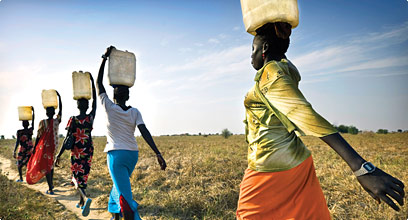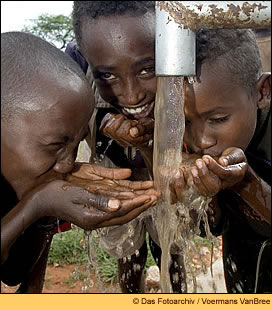IS - Introduction
Institutional sustainability in the WASH sector means that WASH systems, institutions, policies and procedures at the local level are functional and meet the demand of users of WASH services. Households and other WASH service users, authorities and service providers at the local and national level are clear on their own roles, tasks and responsibilities, are capable of fulfilling these roles effectively and are transparent to each other. WASH stakeholders work together in the WASH chain through a multi-stakeholder approach.
Vision

WASH systems, institutions, policies and procedures should meet the demand of all different users of WASH services effectively and ensure transparency. They should ensure the roles, tasks and responsibilities of all stakeholders in such a way that their collaboration and coordination leads to the delivery of WASH services with the required quantities and qualities. All of these systems, institutions, policies and procedures should be constantly updated based on inputs of all stakeholders.
- The role of NGOs will shift from implementing to facilitating: NGOs support communities to achieve their rights to WASH and facilitate improvement in multi-stakeholder coordination and synergy in the WASH sector.
- The public sector fulfills a leading and coordinative role in the WASH sector.
- The role of the private sector in the WASH service delivery increases significantly.
- Communities, specifically women, claim and use their right to sustainable water and sanitation services.
Trends
- Increased recognition that only by collaboration between all WASH sector stakeholders will effective and sustainable WASH delivery be achieved.
- The decentralisation of the government offers a chance to bring WASH services closer to the communities to ensure proper implementation and influence of policies.
- It is broadly recognised that free services are not sustainable and that a more ‘business like’ approach is required.
- The private sector is interested to develop sound technical and cost-effective WASH services, adapted to more marginal groups.
- The civil society can now better concentrate on their key role of facilitation of the WASH chain, lobby and advocacy, especially towards ensuring the rights of marginalised groups to WASH services. This greater focus of NGOs is desired and will ensure the quality of their work and interventions.
- Communities are more aware of the need to contribute time and resources for the operation and maintenance of WASH services. Having rights also implies having duties.
Challenges

Access to WASH services is a basic human right, and ensuring the provision of WASH services is ultimately a government responsibility. The institutions that are responsible for the service (duty bearers) do not always have the political will to fulfill their duties or lack capacity to fulfill their role. A systematic or integrated approach towards solving WASH problems is lacking. Too many actors are using different approaches, which are not well coordinated. Government, civil society and the private sector are not working optimally together towards the improvement of access to WASH services.
- NGOs fill existing gaps in WASH services to marginal and isolated communities with funds from (inter)national donors. By taking this implementing role, they are taking away the responsibility of other actors to ensure the provision of WASH services. They lack at times the required technical expertise.
- The institutional framework in terms of policies, procedures, standards, roles and responsibilities is relatively transparent for drinking water, but lacks for sanitation and hygiene. In those latter cases the distribution of tasks and responsibilities between different Ministries (Health, Water, and Environment) at different levels remains unclear. A related problem is that the process of decentralization, though an interesting opportunity for greater participation of communities, is taking place without transfer of the necessary financial means and technical capacities to local levels.
- The private sector is too limited to urban areas. The local market is not functioning in an optimal way to encourage business investment and operation to invest in and develop relevant WASH services, especially for marginal and isolated communities.
- Communities, especially women and marginalised groups, have long been regarded as vulnerable and weak, as victims of injustice. Too little attention has been paid to their capacities and strong points. The experiences with the provision of free services have not led to sustained services in the long run.
- Multi-actor platforms where WASH actors meet, and learn, discuss and plan together are not always well in place. This absence hinders necessary collaboration and coordination between them.
Approaches
The WASH Alliance promotes an integrated approach to the WASH sector, which includes: the mobilization and organisation of the community around their right to WASH; clarifying roles and responsibilities of all WASH actors and the facilitation of multi-stakeholder platforms; building the capacity of the sector(s) towards better delivery; lobby and advocacy towards better policies and mobilization of government budgets. Below these elements are further explained:
- Partnering with women and coalitions at local level
- Building strong organisations around specific interests
- Inputs of women will be pivotal, including their leadership to achieve results
- Coalitions of different local WASH user groups will scale up their interventions and influence
Setting up and facilitation of multi-stakeholder platforms
All stakeholders in the WASH sector should know, from themselves and from each other, what is expected from them in terms of their specific roles and responsibilities, competencies and focus. This considers all stakeholders in the WASH chain. Determination and agreement of these roles and responsibilities include the interaction between all different WASH actors. Multi-stakeholder platforms will be set up and facilitated and will be the meeting places for all these WASH actors, while constituting the basis for joint discussion, negotiation, planning, monitoring and evaluation, and learning. They will take into account different levels: local, regional and national. They are also a relevant place for lobby & advocacy. Platforms are essential for coordination of activities and use of budgets for better performance of each actor. They may at start have an informal character and gradually develop into more formal bodies, if required and desired.
Capacity building

To achieve a better performance in the WASH sector, capacity building is needed at different levels for the different actors in accordance with the specific roles and responsibilities, thus achieving both better performing WASH actors and improved coordination between all different players in the sector.
Three levels of capacity building:
- Human Resource Development (HRD), enhancing knowledge, skills and capacities of individuals in technical, personal and managerial areas
- Organisational Development (OD), improving organisational performance, management, systems and governance, in order to build effective, efficient and accountable institutions
- Institutional Development (ID), strengthening interrelationships between stakeholders, strengthening cooperation and coordination, clarifying tasks, roles and terms of interaction
Advocate for increased responsibility and involvement in decision-making
In the Multi-stakeholder platforms, during capacity building and at any relevant opportunity the actors of the WASH Alliance will advocate:
- For the specific involvement of women and marginalised groups in decision making to ensure equity for all users.
- For the active role of water users in L&A as this increases legitimacy of claims; L&A on behalf of water users by other actors will be minimised
- For budget tracking to be taken up as a special activity in the hands of communities to make sure that funds from the national level will reach the right beneficiaries.
- To convince public and private stakeholders to invest in and create an enabling environment for WASH services.
- As much as possible based on evidence based inputs. For that purpose the search for and documentation of evidence based cases is of prime importance
- For both formulation and practical implementation of relevant policies
Criteria for sustainability
- A mandated local party, responsible for the delivery of services and/or products, and that represents especially the interests of the weakest stakeholders, has (or gets) a leading role. Local party: local business or government.
- The interests of the different stakeholders in the WASH chain are structurally incorporated and met.
- Activities must be in accordance with local policies, laws and regulations. If not this must be solved through improved cooperation and coordination in line with sustainability criteria.
- Transparency and accountability of planning and the use of budget and results must be met by all stakeholders involved (e.g. by the use of innovative ICT applications).
- Training/capacity building of a.o., the local private sector, must be structurally embedded in order to ensure sustainability of the service/product.
Acknowledgements
The Dutch WASH Alliance: An alliance of six NGOs
The Dutch WASH Alliance (DWA) is a consortium of six Dutch NGOs (Simavi, Akvo, AMREF Flying Doctors, ICCO, RAIN and WASTE) working together towards a society in which everybody has access to sustainable water, sanitation and hygiene in developing countries. In this alliance, we intensify our already ongoing cooperation and coordination in order to further increase effectiveness and efficiency and learn from each other.
- IRC / Triple-S: Water services that last
- Dutch Water Alliance – Institutional Sustainability
- IRC – Capacity Support to Local Governance
- WaterAid – Governance
This Institutional Sustainability Introduction page was in part from the document: FIETS sustainability approach by the Dutch WASH Alliance.
